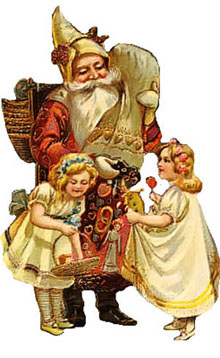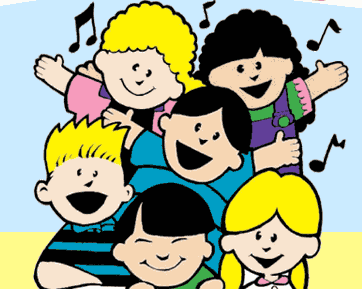 Mamacita says: Whether or not you celebrate Christmas has nothing whatsoever to do with being Santa Claus for someone. Call it whatever you wish: just call it something, and go forth and do it. Letting your soul curl up into a ball of resentment because YOUR religion, or lack of such, doesn’t “do” Christmas is a waste of time, a waste of emotion, a waste of heart, a waste of zeal, and a waste of YOU.
Mamacita says: Whether or not you celebrate Christmas has nothing whatsoever to do with being Santa Claus for someone. Call it whatever you wish: just call it something, and go forth and do it. Letting your soul curl up into a ball of resentment because YOUR religion, or lack of such, doesn’t “do” Christmas is a waste of time, a waste of emotion, a waste of heart, a waste of zeal, and a waste of YOU.
“Charity” doesn’t mean “giving to the poor and needy;” it means LOVE, and love covers all bases. Using a belief system to rationalize your own personal whatevers is a cop-out, plain and simple. There are people out there who need you, and to walk on by because they said or did something that “offended” you is . . . okay, I’ll say it: it’s evil. Selfish and evil.
What do we live for, if it is not to make life less difficult for each other? — George Eliot
The three stages of man:
1. He believes in Santa Claus
2. He doesn’t believe in Santa Claus
3. He IS Santa Claus.
That struck me as being funny, and true. And also, even, a little bit sad, and I’m not sure why. Poignancy is always a combination of emotions, and knowing something wonderful is temporary makes us sad, even while we revel in it.
I am Santa Claus. And I do NOT want to ever let the people I love down, at Christmas or any other time. But I also realize that the people we love most have the most potential for hurting. And for being hurt. Any people who are emotionally involved have tremendous power over each other. I hope we all try to use that power only for good.
You know, like Superman. Superman used his powers for good. Unless he was under the influence of kryptonite, in which case he became a flying armegeddon. I’ve met many human kryptonite chunks, working tirelessly to promote only their own beliefs and working just as tirelessly to tear down everybody else’s. They work so hard at destroying that they’ve no time left for building up.
Let us never allow the influence of ‘something else’ to turn us into anything other than good.
“Something else” being possibly another person, or just, something else. “Under the influence” is “under the influence,” whatever outside ‘something else’ is influencing us.
You are Santa Claus for someone. Do not let them down. The people you know, the people you love, the people you know AND love, and people you don’t even know, need you to be Santa Claus. Nameless, faceless children need you. They need you badly. If you’ve got a biscuit, please give someone half.
No belief system in the universe is a reason NOT to be Santa for someone.
And if you are a person who does not believe in this mysterious spirit of generosity we call Santa Claus, then, um, uh, hmmm. . . . . okay, I’ll say it. You are stupid. Grow up and become Santa Claus. Somewhere out there is a child who desperately needs your powers. It might be your own child, or it might be a stranger’s. What difference does it make what child it is? Get out there and make someone happy. Or, at least, happier. Make a difference. Ho ho ho.
I’ll go even farther: If you are the kind of person who gets all huffy and offended and indignant because someone dared to wish you well in a language not suited to your personal belief system, shame on you. You’re angry because someone DARED wish you well? How dare YOU!!!!! How dare you throw someone’s sincere good wishes back into his/her face!!!!!
Now, get out there and make someone happy. If you have no children, go borrow some.
Life is so fleeting; why waste any of it in offended huffiness? We should all be trying our best to add to life, not suck the wonder out of it.
Oh, and fair warning: if you don’t like the tone of this post, suck it up. It’s the first of many, this season, because easily offended people are one of my favorite targets.
They’re the whiny kid on the playground who is good for a show every time he/she doesn’t get his/her own way.
Is that you? I hope not. Such reactions are ugly in a child, but even uglier in an adult. But if it is, I’ll say it again: shame on you.
Santa is a symbol, a representation of a person who lives to help others. He’s a role model for us all.
Bring it on.

 Mamacita says: James and Lily Potter weren’t the only parents who knew about magic, you know. I love to imagine Christmas at the Burrow, also; Molly and Arthur Weasley, poor as they were, must have given their large family a wonderland of inexpensive dreams-come-true. Hogwarts gave its students a magical Christmas experience, too, as all good teachers and schools
Mamacita says: James and Lily Potter weren’t the only parents who knew about magic, you know. I love to imagine Christmas at the Burrow, also; Molly and Arthur Weasley, poor as they were, must have given their large family a wonderland of inexpensive dreams-come-true. Hogwarts gave its students a magical Christmas experience, too, as all good teachers and schools  Parents are magic, you know. ALL parents can do it if they try. We have, in our fingertips and in our heads and in all those old boxes, the power to transform ordinary things into things of magic and wonder. We have the power to transform an ordinary day into a Holiday. There is more than tinsel and glass and molded Hallmark treasures in those boxes. There are memories, stored in those boxes. There is each child’s First Christmas, in those boxes. There is the Christmas we were all too sick to go to Grandma’s, so we had to stay home and entertain each other. There is an ornament from the Christmas of the Emergency Room visit. There are ornaments made of styrofoam and glue and glitter. There is the ornament someone bought in the Chicago airport, just because it caught his eye and he thought someone else might like it. There is the ornament a little girl used to lie under the tree and watch, JUST IN CASE the elves would peek out the window of it and wave at her. There
Parents are magic, you know. ALL parents can do it if they try. We have, in our fingertips and in our heads and in all those old boxes, the power to transform ordinary things into things of magic and wonder. We have the power to transform an ordinary day into a Holiday. There is more than tinsel and glass and molded Hallmark treasures in those boxes. There are memories, stored in those boxes. There is each child’s First Christmas, in those boxes. There is the Christmas we were all too sick to go to Grandma’s, so we had to stay home and entertain each other. There is an ornament from the Christmas of the Emergency Room visit. There are ornaments made of styrofoam and glue and glitter. There is the ornament someone bought in the Chicago airport, just because it caught his eye and he thought someone else might like it. There is the ornament a little girl used to lie under the tree and watch, JUST IN CASE the elves would peek out the window of it and wave at her. There  is the ornament with sad eyes that a little boy worried about, year after year, and which must be hung in exactly the same spot on the tree – and low, because it’s really, really heavy. I have a Christmas angel made out of a torn purple pillow case and a toilet paper tube, and a piece of that same pillow case with “Oh come holy spit” written on it in black magic marker. It’s worth more to me than anything in Tiffany’s. Erma Bombeck had one, too; when I read about hers I felt kinship! There are ornaments from friends, and ornaments found at yard sales and flea markets. Every ornament on our tree has a history. I know where and when everything on that tree was purchased, or made, or given. A real Christmas fanatic can tell you the circumstances under which almost any ornament on that tree was obtained.
is the ornament with sad eyes that a little boy worried about, year after year, and which must be hung in exactly the same spot on the tree – and low, because it’s really, really heavy. I have a Christmas angel made out of a torn purple pillow case and a toilet paper tube, and a piece of that same pillow case with “Oh come holy spit” written on it in black magic marker. It’s worth more to me than anything in Tiffany’s. Erma Bombeck had one, too; when I read about hers I felt kinship! There are ornaments from friends, and ornaments found at yard sales and flea markets. Every ornament on our tree has a history. I know where and when everything on that tree was purchased, or made, or given. A real Christmas fanatic can tell you the circumstances under which almost any ornament on that tree was obtained. Mamacita says: I really don’t know how anyone could ever say it better than Charles Dickens, unless it was
Mamacita says: I really don’t know how anyone could ever say it better than Charles Dickens, unless it was 
 Mamacita says: Back in the day (when dinosaurs roamed the earth) every American student knew hundreds of songs – all the same songs, for the most part. Every Wednesday morning, kids all over the States would gather in their school’s auditorium, or cafeteria, and sing. In my little grade school, it was called the All-School Sing. The music teacher was in charge, and she didn’t ‘teach’ the students much of anything. She just started playing and all the older kids joined in, and after a few weeks the younger kids had picked up all the lyrics and joined in, too. It was an awesome way to learn the songs, imitating the cool big kids!
Mamacita says: Back in the day (when dinosaurs roamed the earth) every American student knew hundreds of songs – all the same songs, for the most part. Every Wednesday morning, kids all over the States would gather in their school’s auditorium, or cafeteria, and sing. In my little grade school, it was called the All-School Sing. The music teacher was in charge, and she didn’t ‘teach’ the students much of anything. She just started playing and all the older kids joined in, and after a few weeks the younger kids had picked up all the lyrics and joined in, too. It was an awesome way to learn the songs, imitating the cool big kids! Mamacita says: It was his third strike for the same offense. Last Wednesday morning, after class, I had to play “Plagiaristic Confrontation” again, and it was no fun. It’s never fun. All throughout my career, I’ve listened to teachers brag and purr about ‘bringing a student down,’ and I’ve sat there shaking my head in amazement, wondering what kind of people were in charge of classrooms these days. “Bringing a student down” was never a goal of mine; I am frankly horrified that anyone would do so happily, and that anyone could gloat about it afterwards. I always thought that one of my functions was to help students UP, not bring them down and brag about it to others who sat there applauding.
Mamacita says: It was his third strike for the same offense. Last Wednesday morning, after class, I had to play “Plagiaristic Confrontation” again, and it was no fun. It’s never fun. All throughout my career, I’ve listened to teachers brag and purr about ‘bringing a student down,’ and I’ve sat there shaking my head in amazement, wondering what kind of people were in charge of classrooms these days. “Bringing a student down” was never a goal of mine; I am frankly horrified that anyone would do so happily, and that anyone could gloat about it afterwards. I always thought that one of my functions was to help students UP, not bring them down and brag about it to others who sat there applauding.